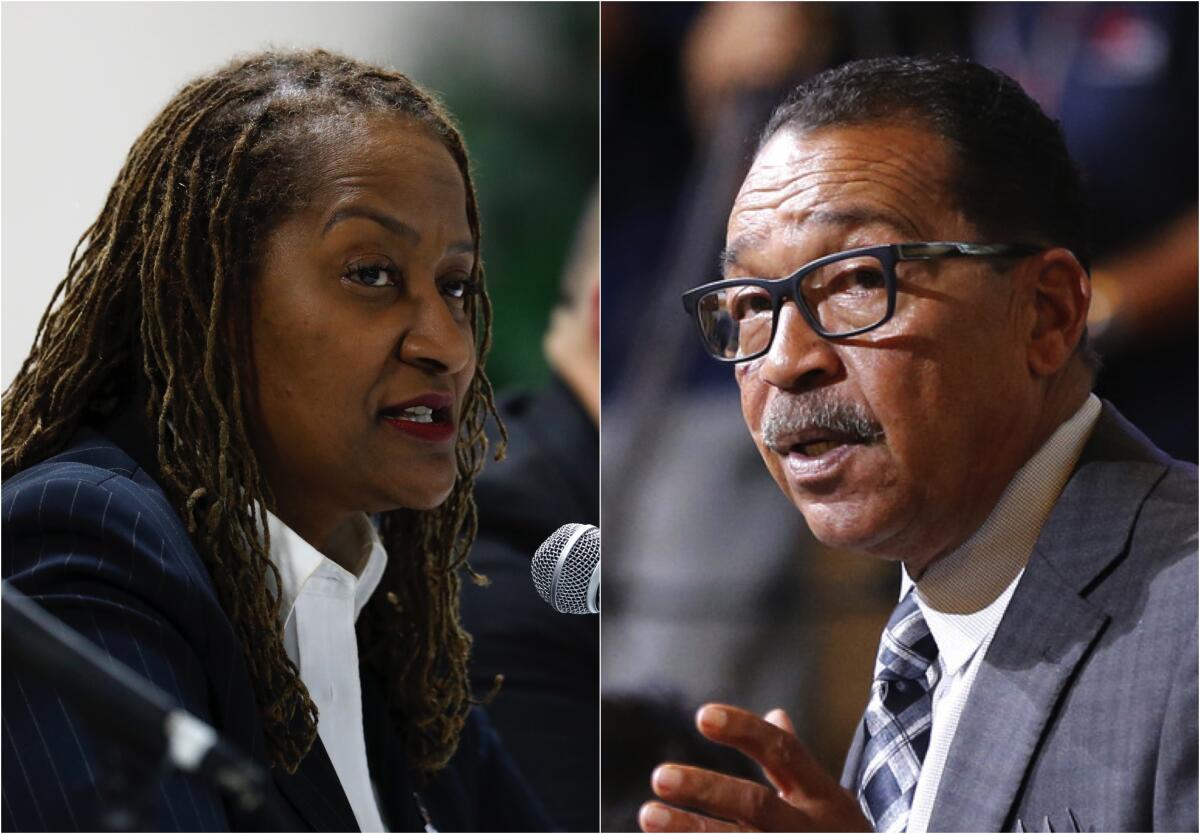Holly Mitchell beats Herb Wesson in race for L.A. County Board of Supervisors seat

- Share via
State Sen. Holly Mitchell will be the next 2nd District supervisor on the powerful Los Angeles County Board of Supervisors.
Mitchell took a strong lead Tuesday evening in the race against Los Angeles City Councilman Herb Wesson, and as election results continued to be tabulated Wednesday, she maintained the top position. As of 4:45 p.m., Mitchell had secured almost 61% of the vote while Wesson was at 39%.
Wesson called Mitchell to concede and was gracious in their conversation about the future of the district and Los Angeles County as a whole, Mitchell’s campaign said.
Political analysts had expected the race to be close, given how many residents knew Wesson and his work on the L.A. City Council.
With Mitchell’s victory, the L.A. County Board of Supervisors, seen as the most powerful local governmental body in the country, will be an all-female board for the first time in history.
In another closely watched county race, supporters of Measure J, a proposal that would direct more county money to social services and jail diversion programs, declared victory Tuesday evening after the measure secured 57% of the vote. It has pulled in more than 1.6 million votes of support.
“The passage of Measure J is the tipping point for justice not only in L.A. County but across the country,” Isaac Bryan, co-chair of the Yes on Measure J campaign, said in a statement. “For decades we have fought to change hearts, minds and policy. Finally, our communities will have the resources to bring our freedom dreams to life.”
The race for the board seat was influenced by months of civil unrest, with both candidates focused on highlighting their records on criminal justice reform.
“Both Mitchell and Wesson will try to make the case that they are better at continuing the fight for reform on the board,” said Earl Ofari Hutchinson, a political analyst and longtime L.A. community activist. “How well each make that case will be huge with how voters view their candidacy.”
Political analysts and community activists anticipated that the contest could come down to which candidate voters believed was more invested in addressing the COVID-19 pandemic, homelessness and affordable housing.
“How are we going to take care of our fellow neighbors? That’s what this particular election is about in 2020, is electing somebody you, for sure, have the confidence will make sure we can all live in L.A. County during and after this pandemic. Period,” said Tina McKinnor, a longtime political strategist and civic engagement director from LA Voice Action, which supported Mitchell in the race. “We have to get through COVID or nothing can be done.”
The candidates’ profiles cut across gender and generational lines.
In the tight Los Angeles County supervisor race between state Sen. Holly Mitchell and L.A. City Councilman Herb Wesson, ties to law enforcement and commitment to reform become top issues.
Mitchell, 56, came to politics in 2010 after leading a large L.A. child and family care organization, and she is known among her peers in the Legislature as an astute anti-poverty policymaker.
A mother of an adult son, Mitchell had a big break in the Senate five years ago when she stood up to her fellow Democrats, arguing that their budget failed to appropriately serve poor Californians.
Wesson, 68, has held public office for 22 years, most recently on the Los Angeles City Council.
A father of four, including one son experiencing homelessness, Wesson is known as a savvy negotiator who pushed for multiple increases in the city’s minimum wage but has been dogged by accusations that he gives in easily to special interests, including real estate developers.
While Wesson was serving as council president, the FBI launched a corruption investigation into City Hall, which focused largely on Councilman Jose Huizar, who faces charges of bribery and money laundering and whom Wesson once called his “best friend” on the 15-member council.
Wesson has not faced allegations. In January 2019, his chief of staff was included in an FBI search warrant seeking evidence for its investigation but has not been publicly accused of any wrongdoing.
Mitchell has highlighted the corruption scandal in her TV ads.
“When he continues to talk about and remind us that he was the leader of the council and all that power afforded him to do, one has to wonder,” Mitchell said in an interview.
Wesson has pushed back and said he was shocked to find out what Huizar was accused of doing.
“I am disgusted by what occurred, and no matter what we do, it is virtually impossible to legislate integrity,” he said.
The measure would require that 10% of county funds be spent on social services such as housing and jail diversion programs. The county would be prohibited from using the money on prisons, jails or law enforcement agencies.
Another decision for voters in L.A. County was Measure J.
Measure J will require that 10% of locally generated, unrestricted county money — estimated between $360 million and $900 million — be spent on a variety of social services, including housing, mental health treatment and jail diversion programs, and used for investments in communities disproportionally harmed by racism. The county would be prohibited from using the money on prisons, jails or law enforcement agencies.
The measure was placed on the ballot by the Board of Supervisors amid growing calls for criminal justice reforms after a spate of local law enforcement shootings and the police killing of George Floyd in Minneapolis.
Supporters said the public outrage over the shootings gave momentum to long-standing efforts to increase non-law-enforcement investments in communities of color.
“We have tried building political movements out of the loss of life in Los Angeles County and to fight just for some crumbs in the budget, and what we continue to be told is, ‘There’s no money for alternatives to incarceration, there’s no money to expand mental health” and addiction treatment, said Eunisses Hernandez, co-chair of the Re-Imagine L.A. County campaign, which led the charge on supporting Measure J.
Some believed the measure was rushed, including the League of Women Voters of L.A. County, which was neutral on the measure.
Opponents of Measure J include the Assn. for Los Angeles Deputy Sheriffs, which spent more than $3.5 million on campaign advertising on TV and social media.
While Measure J doesn’t call directly for police budget cuts, opponents say money would inevitably be slashed from law enforcement, with L.A. County Sheriff Alex Villanueva, in a tweet, going so far as to raise the specter of a “Mad Max” future in the region if the measure passes.
Political experts agreed it was hard to discern how voters would swing on Measure J.
Former Supervisor Zev Yaroslavsky, who authored several ballot initiatives during his 20 years on the board, said it’s usually important for the supervisors to make the case for a funding measure over a period of time.
“In this particular instance, the case was being made on national television every day from the murder of George Floyd forward,” said Yaroslavsky, who represented the 3rd District until 2014.
More to Read
Sign up for Essential California
The most important California stories and recommendations in your inbox every morning.
You may occasionally receive promotional content from the Los Angeles Times.














